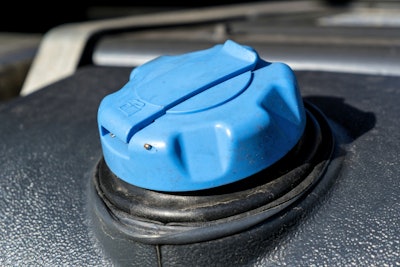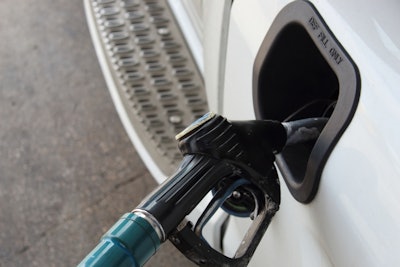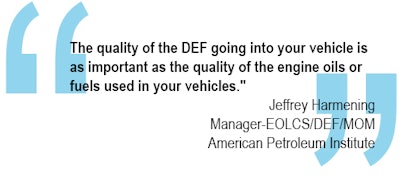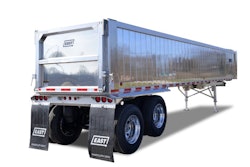
Diesel exhaust fluid (DEF) doesn’t require a lot of attention, but with summer ready to heat up, precautions should be taken to protect the fluid from the impact of high temperatures, which can decrease its useful life.
DEF’s shelf life is directly related to its storage temperature. Jay Gagnon, senior product manager for BlueDEF, recommended storage temperatures between 12 and 86 degrees Fahrenheit to maintain an optimal shelf life of up to two years. The container should be protected from direct sunlight, he said.
Purchasing DEF at a truck stop
 While many states have regulations that require identifying the DEF manufacturer and brand on pump receipts, some locations do not include it.
While many states have regulations that require identifying the DEF manufacturer and brand on pump receipts, some locations do not include it.Generally, there are no labeling requirements for DEF at the pump, which can make knowing the actual brand of the DEF being dispensed a mystery. While many states have regulations that require identifying the manufacturer and brand on pump receipts, some locations do not include it.
“Poor-quality DEF can cause mechanical and drivability issues, and when this happens, word gets around quickly,” Gagnon said. “Your best assurance of receiving high-quality DEF is dealer reputation and peer word-of-mouth.”
Drivers accustomed to purchasing DEF in containers should look at the expiration date if it’s printed on the bottle and use it before that date, said Jeffrey Harmening, manager-EOLCS/DEF/MOM for the American Petroleum Institute (API). If an expiration date is not present, look at the traceability code for a date.
“This date is usually equivalent to the packaging date,” Harmening said. “As a last resort, ask for the most recently delivered DEF products.”
DEF storage in a truck
BlueDEF is stable, colorless, nonflammable and nontoxic, and Gagnon said it is classified as a minimum risk for transportation.
Harmening said DEF should not be stored for extended periods in a truck, especially if the storage area in the vehicle often is hotter than the recommended storage temperatures displayed on the label.
“DEF stored at 86 degrees and above will only last about six months,” he said.
Purchasing DEF for shop use

“One way to do this is to ensure that their supplier is providing a Certificate of Analysis (or Quality) with every shipment that addresses all of the quality characteristics that the specification requires,” Harmening said. “Purchasing API-licensed DEF is the best way to be sure your DEF meets the rigorous requirements of the specification, because these products are not only tested before they are released to the marketplace, they are also subject to testing in API’s Aftermarket Audit Program.”
For shops, handling, storage and dispensing DEF is important, Harmening said, to help prevent off-spec DEF from reaching the marketplace.
“Temperature during transport or at the point of storage or sale can harm the shelf life of DEF sold in containers,” he said, adding that shops and drivers should make sure their DEF stock is rotated to use the oldest product first. “It’s important to know what you are putting into your DEF tank. The quality of the DEF going into your vehicle is as important as the quality of the engine oils or fuels used in your vehicles.”
Additional considerations when storing and handing DEF, according to Harmening, include the following:
- Bulk storage tanks should be dedicated for DEF. Don’t switch products in the bulk tank without rinsing it with distilled or deionized water or on-spec DEF.
- A closed loop system for transferring DEF from a drum or bulk tank is recommended so contaminants don’t get into the DEF. This is important in a shop or construction site with dust or dirt in the air.
- Use dedicated equipment for putting DEF in a tank. Don’t use funnels, pitchers, hoses, etc. that are used for other fluids.
- Anything used for dispensing DEF should be cleaned with distilled or deionized water and followed by a DEF rinse. Don’t use tap water for cleaning.











